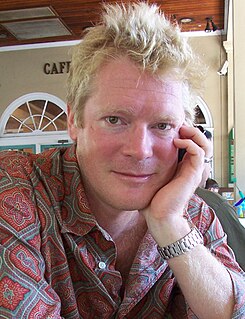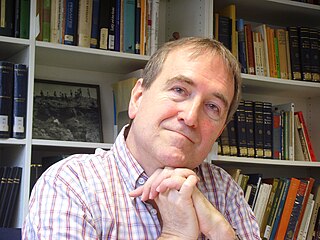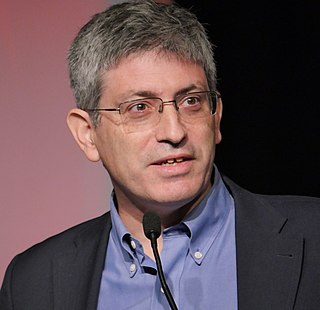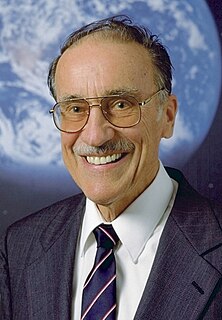
Edward Osborne Wilson was an American biologist, naturalist, and writer. His specialty was myrmecology, the study of ants, on which he was called the world's leading expert, and he was nicknamed Ant Man.

Svante Pääbo is a Swedish geneticist specialising in the field of evolutionary genetics. As one of the founders of paleogenetics, he has worked extensively on the neanderthal genome. He was appointed director of the Department of Genetics at the Max Planck Institute for Evolutionary Anthropology in Leipzig, Germany in 1997.

David Takayoshi Suzuki is a Canadian academic, science broadcaster, and environmental activist. Suzuki earned a Ph.D. in zoology from the University of Chicago in 1961, and was a professor in the genetics department at the University of British Columbia from 1963 until his retirement in 2001. Since the mid-1970s, Suzuki has been known for his television and radio series, documentaries and books about nature and the environment. He is best known as host and narrator of the popular and long-running CBC Television science program The Nature of Things, seen in over 40 countries. He is also well known for criticizing governments for their lack of action to protect the environment.

The Long Now Foundation, established in 1996, is an American non-profit organization based in San Francisco that seeks to start and promote a long-term cultural institution. It aims to provide a counterpoint to what it views as today's "faster/cheaper" mindset and to promote "slower/better" thinking. The Long Now Foundation hopes to "creatively foster responsibility" in the framework of the next 10,000 years. In a manner somewhat similar to the Holocene calendar, the foundation uses 5-digit dates to address the Year 10,000 problem. The organisation's logo is X, a capital X with an overline, a representation of 10,000 in Roman numerals.

Global cooling was a conjecture, especially during the 1970s, of imminent cooling of the Earth culminating in a period of extensive glaciation, due to the cooling effects of aerosols or orbital forcing. Some press reports in the 1970s speculated about continued cooling; these did not accurately reflect the scientific literature of the time, which was generally more concerned with warming from an enhanced greenhouse effect.

The International Rice Research Institute (IRRI) is an international agricultural research and training organization with its headquarters in Los Baños, Laguna in the Philippines, and offices in seventeen countries. IRRI is known for its work in developing rice varieties that contributed to the Green Revolution in the 1960s which preempted the famine in Asia.

The Dan David Prize is a major international award that recognizes and supports outstanding contributions to the study of history and other disciplines that shed light on the human past. It awards nine prizes of $300,000 each year to outstanding early- and mid-career scholars and practitioners in the historical disciplines. The Prize has an annual purse of $3 million, making it the largest history award in the world, with the remaining $300,000 funding an international postdoctoral fellowship program at Tel Aviv University, where the Prize is headquartered. The Prize is endowed by the Dan David Foundation.

Wallace "Wally" Smith Broecker was an American geochemist. He was the Newberry Professor in the Department of Earth and Environmental Sciences at Columbia University, a scientist at Columbia's Lamont–Doherty Earth Observatory and a sustainability fellow at Arizona State University. He developed the idea of a global "conveyor belt" linking the circulation of the global ocean and made major contributions to the science of the carbon cycle and the use of chemical tracers and isotope dating in oceanography. Broecker popularized the term "global warming". He received the Crafoord Prize and the Vetlesen Prize.

Spencer Wells is an American geneticist, anthropologist, author and entrepreneur. He co-hosts The Insight podcast with Razib Khan. Wells led The Genographic Project from 2005 to 2015, as an Explorer-in-Residence at the National Geographic Society, and is the founder and executive director of personal genomics nonprofit The Insitome Institute.

Christopher Brian Stringer is a British physical anthropologist noted for his work on human evolution.

Carl Zimmer is a popular science writer, blogger, columnist, and journalist who specializes in the topics of evolution, parasites, and heredity. The author of many books, he contributes science essays to publications such as The New York Times, Discover, and National Geographic. He is a fellow at Yale University's Morse College and adjunct professor of molecular biophysics and biochemistry at Yale University. Zimmer also gives frequent lectures and has appeared on many radio shows, including National Public Radio's Radiolab, Fresh Air, and This American Life.

Walter P. Kistler was a physicist, inventor, and philanthropist, born in Biel, Switzerland. Kistler was a life member of the Swiss Physical Society and a member of AIAA and ISA, which presented him the Life Achievement Award in 2000. He held patents on more than 50 inventions in the scientific and industrial instrumentation fields, and had published a number of papers in scientific and trade journals. He was a major donor to a eugenics research organization, the Pioneer Fund.
Gregory Stock is a biophysicist, best-selling author, biotech entrepreneur, and the former director of the Program on Medicine, Technology and Society at UCLA’s School of Medicine. His interests lie in the scientific and evolutionary as well as ethical, social and political implications of today's revolutions in the life sciences and in information technology and computers.
The Richard Lounsbery Award is given to American and French scientists, 45 years or younger, in recognition of "extraordinary scientific achievement in biology and medicine."
The Prime Minister's Prizes for Science are annual Australian awards for outstanding achievements in scientific research, innovation, and teaching. The prizes have been awarded since 2000, when they replaced the Australia Prize for science.

Robert A. Citron, often called Bob Citron was an American entrepreneur and aerospace engineer who was born in Brooklyn, New York, and educated at the University of the Philippines and aeronautical engineering from Northrop University (1953–1959). Citron helped establish and manage the Smithsonian Astrophysical Observatory’s Operation Moonwatch and Precision Optical Satellite Tracking Programs (STP) after the launch of Sputnik I in 1957. He founded or co-founded five companies dealing with documentary film production, publishing, space research and space logistics support, reusable satellite launch systems, and Lunar transportation and logistics. Citron also started three nonprofit foundations dealing with scientific field research. He died on January 31, 2012, at his home in Bellevue, Washington, at the age of 79, due to complications from prostate cancer.
The Wiley Prize in Biomedical Sciences is intended to recognize breakthrough research in pure or applied life science research that is distinguished by its excellence, originality and impact on our understanding of biological systems and processes. The award may recognize a specific contribution or series of contributions that demonstrate the nominee’s significant leadership in the development of research concepts or their clinical application. Particular emphasis will be placed on research that champions novel approaches and challenges accepted thinking in the biomedical sciences.
The Warren Alpert Foundation Prize is awarded annually to scientist(s) whose scientific achievements have led to the prevention, cure or treatment of human diseases or disorders, and/or whose research constitutes a seminal scientific finding that holds great promise of ultimately changing our understanding of or ability to treat disease. The prize was established in 1987 by the late philanthropist and businessman Warren Alpert and the Warren Alpert Foundation.

Before the Dawn: Recovering the Lost History of Our Ancestors is a non-fiction book by Nicholas Wade, a science reporter for The New York Times. It was published in 2006 by the Penguin Group. By drawing upon research on the human genome, the book attempts to piece together what Wade calls "two vanished periods": the five million years of human evolution from the development of bipedalism leading up to behavioural modernity around 50,000 years ago, and the 45,000 subsequent years of prehistory.

Recent human evolution refers to evolutionary adaptation, sexual and natural selection, and genetic drift within Homo sapiens populations, since their separation and dispersal in the Middle Paleolithic about 50,000 years ago. Contrary to popular belief, not only are humans still evolving, their evolution since the dawn of agriculture is faster than ever before. It has been proposed that human culture acts as a selective force in human evolution and has accelerated it; however, this is disputed. With a sufficiently large data set and modern research methods, scientists can study the changes in the frequency of an allele occurring in a tiny subset of the population over a single lifetime, the shortest meaningful time scale in evolution. Comparing a given gene with that of other species enables geneticists to determine whether it is rapidly evolving in humans alone. For example, while human DNA is on average 98% identical to chimp DNA, the so-called Human Accelerated Region 1 (HAR1), involved in the development of the brain, is only 85% similar.













